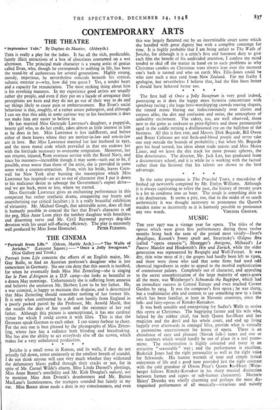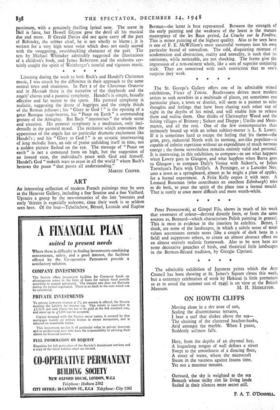MUSIC
THE year 1927 was a vintage year for opera. The titles of the operas which were given first performances during those twelve months bring back the taste of the period most vividly—Ibert's Angelique, Krenek's Donny spielt auf, Stravinsky's (Edipus Rex (called " opera oratorio "), Honegger's Antigone, Milhaud's Le Pauvre Matelot and Hindemith's Hin and Zurack, while the older generation was represented by Respighi and Wolf-Ferrari. It was dry, thin wine most of it ; the grapes had hardly been left to ripen, and there were those who said that some firms had used odd chemical ingredients in order to appeal to the morbid sophistication of connoisseur palates. Completely out of character, and appealing to the secret unsophistication of the large majority of opera-goers all the more, was Weinberger's Schwanda the Bagpiper, which had an immediate success in Central Europe and even reached Covent Garden by 1934. It was the composer's first opera ; he was thirty, but a traditionalist able and content to say something new in a form which has been familiar, at least in Slavonic countries, since the folk- and fairy-operas of Rimsky-Korsakov.
It was both sensible and enterprising for Sadler's Wells to revive this opera at Christmas. The bagpiping farmer and his wife who, helped by the robber chief, fox both Queen Ice-Heart and her magician and the devil and his whole court, and end up living happily ever afterwards in conjugal bliss, provide what is virtually a pantomime entertainment for lovers of opera. There is an abundance of easy and pleasant (Slovak folk-) tunes and one or two numbers which would hardly be out of place in a real panto- mime. The orchestration is highly coloured and noisy in an attractive " seasonable " way ; and the performance is excellent. Roderick Jones had the right personality as well as the right voice for Schwanda. His human warmth of tone and simple lyrical enjoyment of life and a good tune provided just the right contrast with the cold grandeur of Olwen Price's Queen lice-Heart (Wein- berger follows Rimsky-Korsakov in his sharp musical distinction between human and super- or sub-human characters). Marjorie Shires' Dorotka was wholly charming and perhaps the most dis- tinguished performance of all musically—vivacious and naively passionate, with a genuinely thrilling lyrical note. The scene in Hell is farce, but Howell Glynne gave the devil all his musical due and more. If Gerald Davies did not quite carry off the part of Babinsky, the robber chief, he is not wholly to blame ; .it is written for a very high tenor voice which does not easily accord with the swaggering, swashbuckling character of the part. The sets by Michael Whittaker admirably suggested the illustrations of a children's book, and James Robertson and the orchestra cer- tainly caught the spirit of Weinberger's tuneful and vigorous music.
* * * *
Listening during the week to both Bach's and Handel's Christmas music, I was struck by the difference in their approach to the same central texts and situations. In Part 2 of the Christmas Oratorio and in Messiah there is the narrative of the shepherds and the angels' chorus and a pastoral symphony. Handel's is simple, broadly effective and far nearer to the opera. His pastoral symphony is realistic, suggesting the drone of bagpipes and the simple thirds of the Roman piff erari ; his " Glory to God ! " is the opening of a great Baroque stage-heaven, his " Peace on Earth " a commanding gesture of the Almighty. But Bach " interiorises " the whole scene and situation. His pastoral symphony is a meditation, only inci- dentally in the pastoral mood. The recitative which announces the appearance of the angels has no particular dramatic excitement like Handel's ; and his " Glory to God ! " is an ecstatic interweaving of long melodic lines, an ode of praise unfolding itself in time, not a sudden picture flashed on the eye. The message of " Peace on earth " is not a command from on high, but the suggestion of an inward state, the individual's peace with God and himself. Handel's God " maketh wars to cease in all the world" where Bach's bestows the peace " that passes all understanding."
MARTIN COOPER.



































 Previous page
Previous page